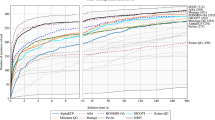Abstract
In this paper, we present an improved Partial Enumeration Algorithm for Integer Programming Problems by developing a special algorithm, named PE_SPEEDUP (partial enumeration speedup), to use whatever explicit linear constraints are present to speedup the search for a solution. The method is easy to understand and implement, yet very effective in dealing with many integer programming problems, including knapsack problems, reliability optimization, and spare allocation problems. The algorithm is based on monotonicity properties of the problem functions, and uses function values only; it does not require continuity or differentiability of the problem functions. This allows its use on problems whose functions cannot be expressed in closed algebraic form. The reliability and efficiency of the proposed PE_SPEEDUP algorithm has been demonstrated on some integer optimization problems taken from the literature.
Similar content being viewed by others
References
Aardal, K., & Lenstra, A. K. (2002). Hard equality constrained integer knapsacks. In: W. J. Cook & A. S. Schulz (Eds.), Lecture Notes in Computer Science : Vol. 2337. Integer Programming and Combinatorial Optimization: 9th International IPCO Conference (pp. 350–366). Berlin: Springer. Preliminary version.
Aardal, K., Weismantel, R., & Wolsey, L. A. (2002). Non-standard approaches to integer programming. Discrete Applied Mathematics, 123, 5–74.
Balas, E. (1965). An additive algorithm for solving linear programs with zero-one variables. Operations Research, 13, 517–545.
Chern, M., & Jon, R. (1986). Reliability optimization problems with multiple constraints. IEEE Transactions on Reliability, R-35(4), 431–436.
De Loera, J. A., Haws, D., Hemmecke, R., Huggins, P., & Yoshida, R. (2005). A computational study of integer programming algorithms based on Barvinok’s rational functions. Discrete Optimization, 2, 135–144.
Gilmore, P. C., & Gomory, R. E. (1966). The theory and computation of knapsack functions. Operations Research, 14, 1045–1074.
Gomory, R. E. (1963). An all-integer programming algorithm. In: J. F. Muth & G. L. Thompson (Eds.), Industrial Scheduling. Englewood Cliffs: Prentice-Hall. Chap. 13.
Ha, C., & Kao, W. (2006). Reliability redundancy allocation: An improved realization for nonconvex nonlinear programming problems. European Journal of Operational Research, 171, 24–38.
Land, A. H., & Doig, A. (1960). An automatic method of solving discrete programming problems. Econometrica, 28, 497–520.
Lawler, E. L., & Bell, M. D. (1966). : A method for solving discrete optimization problems. Operations Research, 14, 1098–1112.
Linderoth, J. T., & Savelsbergh, M. W. P. (1999). A computational study of search strategies for mixed integer programming. INFORMS Journal on Computing, 11, 173–187.
Mohan, C., & Nguyen, H. T. (1999). A controlled random search technique incorporating simulated annealing concept for solving integer and mixed integer global optimization problems. Computational Optimization and Applications, 14, 103–132.
Nemhauser, G. L., & Wolsey, L. A. (1999). Integer and Combinatorial Optimization, 2nd edn. New York: Wiley.
Sabbagh, M. S. (1983) A general lexicographic partial enumeration algorithm for the solution of integer nonlinear programming problems. D. Sc. Dissertation, The George Washington University, Washington, D.C.
Sasaki, M., Kaburaki, S., & Yanagi, S. (1977). System availability and optimum spare units. IEEE Transactions on Reliability, R-26, 182–188.
Sherali, H. D., & Driscoll, P. J. (2003). Evolution and state-of-the-art in integer programming. Journal of Computational and Applied Mathematics, 124, 319–340.
Srivastava, V. K., & Fahim, A. (2000). A two-phase optimization procedure for integer programming problems. Computers & Mathematics with Applications, 12, 1585–1595.
Author information
Authors and Affiliations
Corresponding author
Rights and permissions
About this article
Cite this article
Sabbagh, M.S., Soland, R.M. An improved partial enumeration algorithm for integer programming problems. Ann Oper Res 166, 147–161 (2009). https://doi.org/10.1007/s10479-008-0408-0
Published:
Issue Date:
DOI: https://doi.org/10.1007/s10479-008-0408-0




